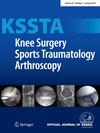Rotator cuff repair: Sleep disturbance significantly improves after arthroscopic tendon repair
Abstract
Purpose
The aim of this study was to quantify sleep quality and define its evolution in patients treated for rotator cuff tears (RCTs) with arthroscopic rotator cuff repair (ARCR) and to understand its correlation with patients' depression and anxiety.
Methods
The patients were part of the ‘ARCR_Pred cohort study’, a prospective multicentre cohort of ARCR patients. Inclusion criteria: adult, RCT diagnosed by magnetic resonance imaging, treated by primary ARCR. Exclusion criteria: irreparable tears, revision operations, open or mini-open reconstructions, pregnancy. Subjective sleep quality (prevalence and level of disturbance) was analysed. Psychological characteristics (PROMIS Sf questionnaire) and functional outcomes (Constant and Murley Score and Oxford Shoulder Score) were investigated. A gender-based analysis was performed as well. Patients were evaluated before the operation and prospectively at 6 and 12 months.
Results
Of the 973 patients, 611 (62.8%) were men, with the mean age being 57.3 ± 9.4 years (range, 21–84). A high prevalence of sleep disturbances was found before ARCR (88.4%), with 59% of the patients complaining of disturbance every night. Sleep disturbances progressively improved at 6 (37.2%) and 12 months (22.0%). Also, nocturnal pain (frequency of night disturbed by pain) progressively improved from 94.3% to 62.4% and then 37.9%. For depression and anxiety, a statistically significant difference (p < 0.05) was retrieved among every group (undisturbed, occasionally and always disturbed) at all follow-ups. On the other hand, the post-op improvement led to a decrease in anxiety and depression levels passing from 50.1 and 51.4 points at baseline to 45.0 and 45.4 at 12 months, respectively. Women had statistically worse sleep quality at 6 and 12 months (41% vs. 36% and 27% vs. 19%, respectively) (p < 0.05).
Conclusions
RCTs cause a high prevalence of sleep disturbance and nocturnal pain, which progressively resolves after an arthroscopic tendon repair. Women have a higher risk than men of presenting disturbed sleep quality.
Level of Evidence
Level III, prognostic cohort study.

 求助内容:
求助内容: 应助结果提醒方式:
应助结果提醒方式:


